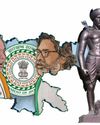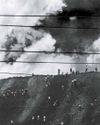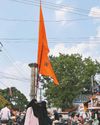His friendly efforts with Pakistan turned sour very quickly with Kargil, but Vajpayee remained balanced and decisive in both situations.

GEN (RETD) V.P.MALIK
PAKISTAN’S Kargil misadventure in May 1999 came barely two months after then PM Atal Behari Vajpayee and his Pakistani counterpart, Nawaz Sharif, signed the Lahore Declaration.
Vajpayee was upset and had let Sharif know that he saw the Kargil intrusion as a breach of trust. Once the war started, he did not interfere, but was always available when we needed anything. When we faced a severe shortage of spares for the Bofors guns—a mainstay of our artillery—Vaj payee got the ban on the firm lifted so we could procure spares and ammunition immediately.
During the war, he visited formation commanders on the front. I was with him the day he went to Kargil. When Pakistan started shelling the town, he watched calmly from the helipad. He also saw wounded soldiers in army hospitals in Srinagar and Udhampur. Initially, when intelligence kept talking of the intruders being Mujahideen, the Cabinet Committee on Security (CCS) decided our armed forces would not cross the Line of Control (LoC). This restriction was primarily due to the nuclear weaponisation of the subcontinent (this aspect was not discussed with military leaders). India also wanted to avoid the UN Security Council; since the May 1998 nuclear test, Western governments were seeing India and Pakistan as rogue nations.
Our military strategy, however, catered for crossing the border if and when needed. I spoke to Vajpayee, asking him not to announce in public that our forces won’t cross the LoC. He understood. That evening, his National Security Advisor, Brajesh Mishra, told a news channel: “Not crossing the LoC or the border holds good today; we don’t know about tomorrow.” A shaken Sharif went running first to Beijing and then to the US.
Denne historien er fra August 27, 2018-utgaven av Outlook.
Start din 7-dagers gratis prøveperiode på Magzter GOLD for å få tilgang til tusenvis av utvalgte premiumhistorier og 9000+ magasiner og aviser.
Allerede abonnent ? Logg på
Denne historien er fra August 27, 2018-utgaven av Outlook.
Start din 7-dagers gratis prøveperiode på Magzter GOLD for å få tilgang til tusenvis av utvalgte premiumhistorier og 9000+ magasiner og aviser.
Allerede abonnent? Logg på

Trump's White House 'Waapsi'
Donald Trump's victory in the US presidential election may very well mean an end to democracy in the near future

IMT Ghaziabad hosted its Annual Convocation Ceremony for the Class of 2024
Shri Suresh Narayanan, Chairman Managing Director of Nestlé India Limited, congratulated and motivated graduates at IMT Ghaziabad's Convocation 2024

Identity and 'Infiltrators'
The Jharkhand Assembly election has emerged as a high-stakes political contest, with the battle for power intensifying between key players in the state.

Beyond Deadlines
Bibek Debroy could engage with even those who were not aligned with his politics or economics

Portraying Absence
Exhibits at a group art show in Kolkata examine existence in the absence

Of Rivers, Jungles and Mountains
In Adivasi poetry, everything breathes, everything is alive and nothing is inferior to humans

Hemant Versus Himanta
Himanta Biswa Sarma brings his hate bandwagon to Jharkhand to rattle Hemant Soren’s tribal identity politics

A Smouldering Wasteland
As Jharkhand goes to the polls, people living in and around Jharia coalfield have just one request for the administration—a life free from smoke, fear and danger for their children

Search for a Narrative
By demanding a separate Sarna Code for the tribals, Hemant Soren has offered the larger issue of tribal identity before the voters

The Historic Bonhomie
While the BJP Is trying to invoke the trope of Bangladeshi infiltrators”, the ground reality paints a different picture pertaining to the historical significance of Muslim-Adivasi camaraderie